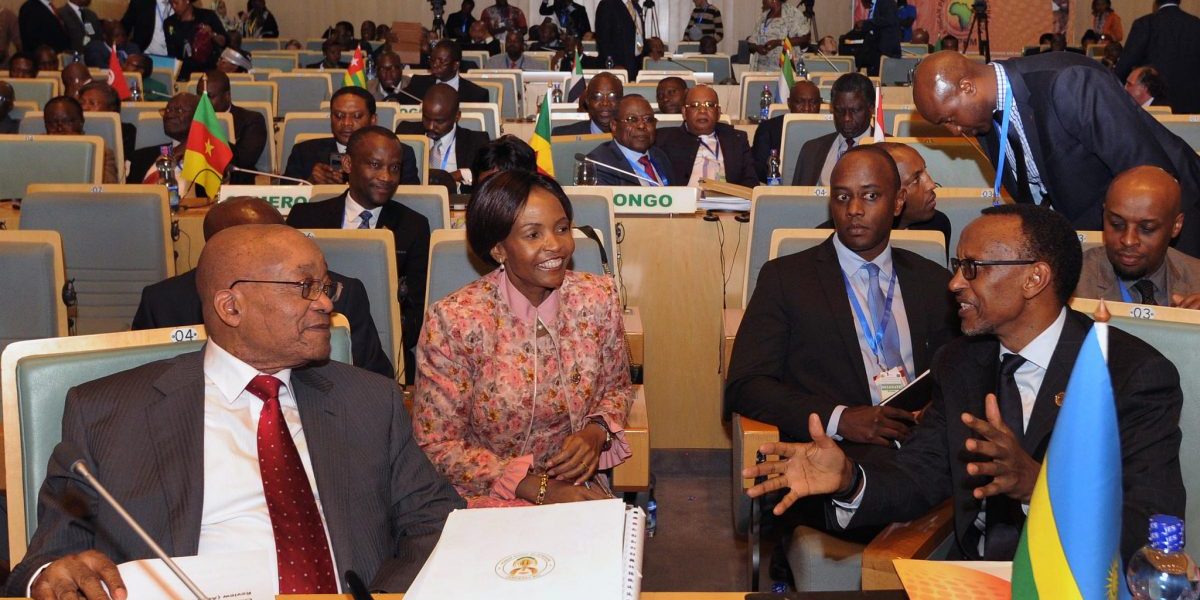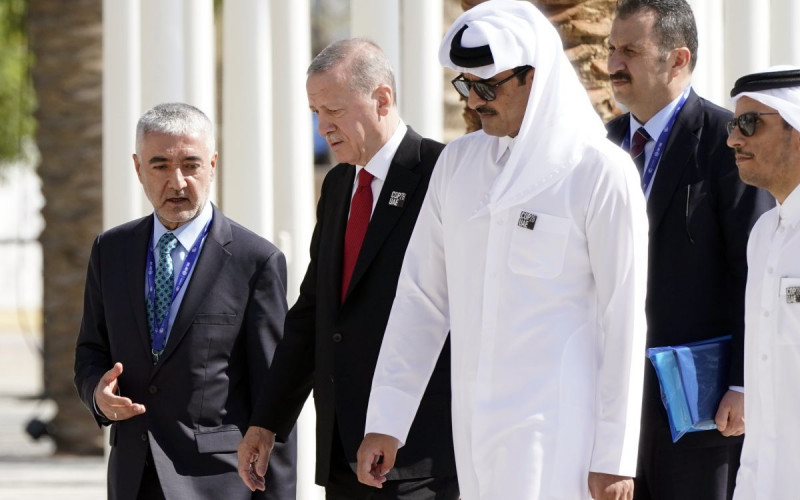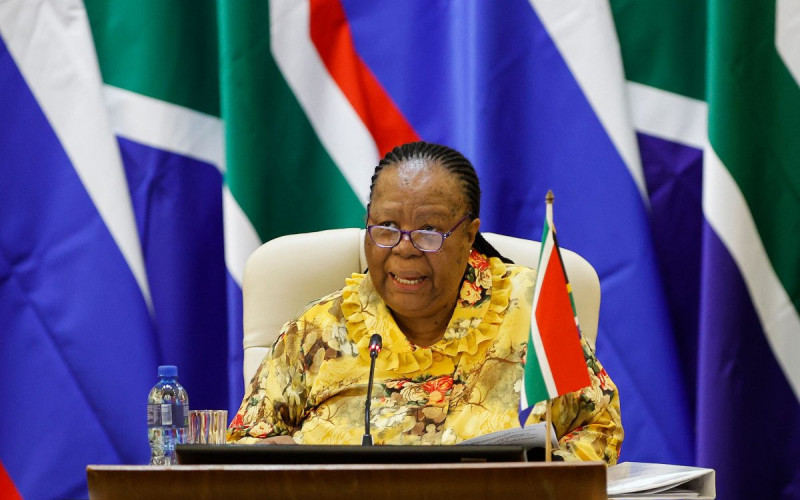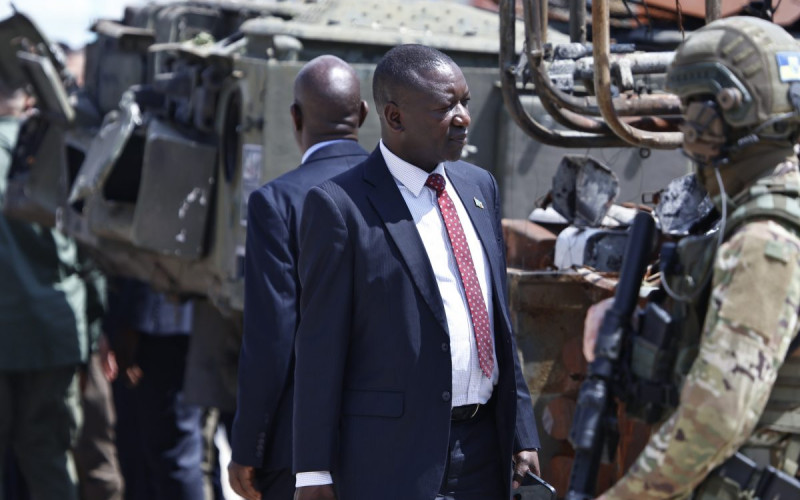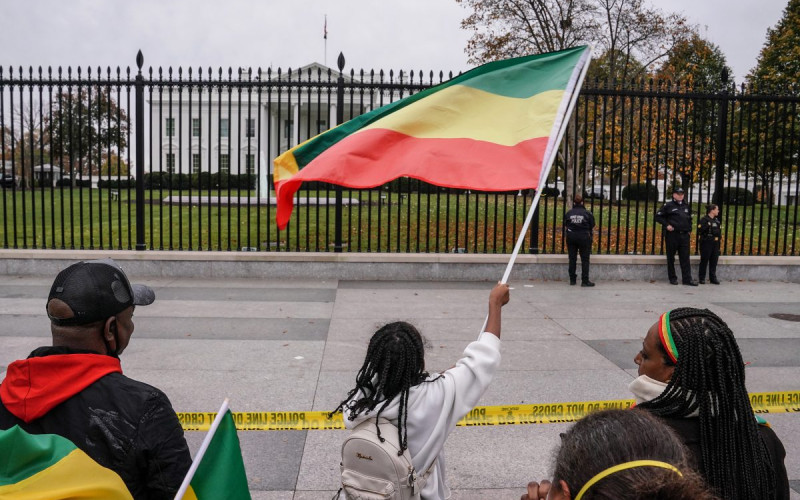Taking Africa Seriously from Within and Without
Inaugural Address, SAIIA
Some weeks ago I was driving out of a parking lot in Cape Town. I came up to the cashier, who was particularly cheerful, and gave her my ticket. “So, did you good business here today ma’am?”
I said yes.
She then inquired about what products I sold. That had me gob smacked momentarily, “Well, I don’t really sell products.” I thought again and said: “I sell intellectual products.”
“Oh, like intellectual property rights? So what exactly do you do?”
I replied a little tongue-in-cheek: “I look at how we can solve Africa’s problems.”
“Oh, that’s easy ma’am,” came the reply, “just get rid of all the governments.”
Please don’t get me wrong. I am not advocating anarchy. But the point made by the cashier raises interesting questions about the nature of governance in Africa. In many cases in the past, African governments have been a hindrance rather than an agent of development.
Thus, if we as Africans are to take ourselves seriously, we need an open and frank self-assessment. This precedes any perceptual change that we might hope to engineer in the external environment.
What would this mean?
- That we do not externalise the causes of our problems and avoid perceiving ourselves as victims of Fate.
- That we are ultimately responsible for our fates – not only as leaders but equally importantly as citizens.
- That we should hold African lives and quality of life as dear as those of any other.
- That our discourse should be determined by common values and principles – based on global benchmarks – and not sensitivities about labels and political correctness.
Let’s be clear. There has been a significant shift in the African discourse since the 1990s, and more so in the last 5-6 years. Moreover, three emerging trends point to a historic juncture in Africa’s future.
Firstly, 20 years ago there would have been no African peacekeepers in Darfur under AU auspices; there would have been no denouncement of unconstitutional changes of power; there would have been no discussion about ‘good governance’ and that the rights of people should be more important than those of states. Much of this change has been brought about by progressive and visionary leaders. And while it has picked up substantial momentum, sustaining it and applying it uniformly is always going to be difficult, because of resistance from entrenched interests and elites.
Secondly, the unprecedented and renewed interest in the continent from the North, primarily as a result of the very successful marketing of Nepad, which has brought with it a spate of international initiatives, provides Africans with important international allies at a time when we need it the most.
Thirdly, there is also a recognition that the world around us is changing fast. New powers are emerging, with new commercial interests, new challenges and competitors, and new political alignments. The power balances are shifting; these may not be obvious yet, but power relations globally will be quite different over the next decade from those we’ve grown accustomed to since the end of the Cold War. Key among those is the rise of China and India.
I will elaborate a little on these three points and then try to address the issue of how Africa should be preparing itself to maximise the opportunities and minimise the threats that these developments present.
The African momentum
When I began preparing this paper, the first point I started making was the need for Africa to sustain the present momentum and international interest to ensure that Africa does not fall off the global agenda. I realised this reflected a particular conditioning. The momentum on good governance, greater opening of the political space, greater responsibility and ownership of conflict resolution, should be maintained and accelerated but not because of external reasons. Rather, internal reasons, namely the interests of the citizens of Africa should be the main motivation.
Taking Africa seriously from within necessitates a clearer sense of accountability of African leadership for the reform process to their people. Five years into Nepad, African political leaders need to make the meaning and benefits of Nepad more evident to the populace. Too often it seems like these reforms are a discussion between the African political elite and the G8. Benefits can be made more tangible by identifying key priorities that should be addressed in each state and setting about doing that in a focused way, because the point about the Nepad vision is that ultimate actualisation rests at the national level.
It is in this regard that the African peer review process is one of the most tangible and potentially most effective tools developed. It is a mechanism which hopes to address some of the most important challenges facing African states and their citizens – those of leadership accountable to the people, sound policies, which have both the intention and the outcome of eradicating poverty and improving the lives of citizens, protecting human rights, and eliminating government by diktat.·
This year marked the completion of the first APRM reports on Ghana and Rwanda. Other assessments are proceeding apace, and South Africa is also beginning the process.
The biggest test of the efficacy of the APRM process will, however, be the extent to which African leadership is bold enough to publish the full reports conducted by the APR Panel on each of the countries, the degree to which these reports are frank and forthright in their assessment and what plans of action emanate from them and how each government sets about addressing the shortcomings – because that is what APRM is about.
The spate of interest in Africa by the G8 among others has spawned responses which focus on how we hold donors to account for all their commitments. I would argue that at this juncture we should be saying, what have our leaders committed to and how have citizens held them to account for these commitments? If citizens and leaders are serious about moving their countries they will not let this opportunity slip by.
But also, both the governors and the governed are at a crossroads between taking a path which places inordinate emphasis on aid as Africa’s salvation or one that is based on an internally-generated dynamic, of which aid may be a part, but only a part. What this means really is that one recognises the responsibility for getting out of the mess is rooted firmly in the leadership and society of Africa. The question leaders should be trying to address is what interventions can we make that are within our powers and capabilities that will make some difference to poverty and suffering.
Equally, on the issue of trade access and subsidies, African states can look at other avenues too. About 70% of tariffs faced by exporters in developing countries are applied by other developing countries. The irony is that a World Bank study shows that developing countries would gain $31 billion a year if they abolished their own manufacturing tariffs and another $31 billion if they also removed their own agricultural tariffs. Why is there an irony here? Because many African states rely on these tariffs for their revenues, because of their small taxpayer base.
African states also need to diversify their trade partners, which continue to reflect their colonial past – unlike in Asia. But we also need industrial strategies before we can do that. Diversification to other partners in raw materials is not going to help Africa.
Early assessments of the MDGs tell us that it is likely that most of Africa will miss the deadline of 2015. MDGs go to the heart of governments’ abilities to deliver improvements on the socio-economic level. Their significance lies not only in the externally imposed ‘deadline’, although this has helped to generate the dynamic.
We should also be thinking beyond the MDGs, because these are not an end in themselves. Their achievement presupposes good infrastructure and good governance, skills to implement and maintain …and then policies to go beyond the minimums set out there. For example, a population where all people have only primary education is not going to prepare you for development in the 21st century.
Heightened international interest in Africa
Nepad’s brilliant marketing may well be its biggest undoing if expectations created do not start being realised.
In the last year, the Commission for Africa has generated much profile for the continent’s maladies, as has Jeffrey Sachs’ UN Millennium Project. The talk is about doubling aid, ensuring better market access for Africa and debt relief. But this is not new; Africa has featured on the annual agenda of the G8 since the Okinawa summit in 2001. The World Bank published its Africa Action Plan in September this year and the EU released its Strategic Plan for the continent last week.
In the last 50-60 years some US$2 trillion has been spent on development. There is agreement that over this period it has accomplished very little.
There are many to blame – the recipient governments; the institutions providing aid; Cold War politics, which saw aid driven by geopolitical imperatives rather than the degree to which it was being used to help development; and the fact that development is a complex and multifaceted issue.
But I am not convinced that throwing more aid, more quickly, over a shorter timeframe at Africa will help any more, given some of the reasons for its inefficacy before. Aid should be a spur for creating and sustaining productive capacity, not a means of entrenching the privileges of the elite. At this juncture we should say, that aid allocations don’t have to be greater, they have to be smarter.
A more rigid enforcement of recognition of the good performers, where aid can make a difference because they have better infrastructure and capacity, is a sine qua non.
There has to be recognition that you can’t fix everything. So where will your money be deployed most effectively? Where can one work in creating pockets of excellence? If these aid institutions were private companies, they may very well have been more meticulous in how they monitored efficacy and the geography of their investment. Aid has measured performance by the amount spent rather than whether that dollar helped to bring water to one or 20 people. Having said this, we should engage more actively in these debates with donors and we should not be embarrassed about advocating a differentiated approach in Africa. All states are not equal in actual political and economic power or in capability and willingness to undertake difficult policy choices.
The changing world order
Sub-Saharan Africa has not done badly in the last few years. Non-oil producing countries are expecting average growth of about 4.5% in 2005, similar to 2004. The number of countries achieving growth in excess of 5% is expected to increase. Real GDP growth in SSA is projected to improve to 5.3% in 2006. Yet, growth in SSA remains below the levels observed in other developing country regions, and as we know, is still insufficient for most countries to achieve the income-poverty MDG.· Only Mozambique, Ethiopia and Sierra Leone, will grow by more than 7% in 2005.
Despite this good growth, sub-Saharan Africa still makes up only about 2% of world trade and its total economy is 1.3% of the global total.· The largest SSA economy is South Africa by far, and that is only 30% of Brazil’s. (The whole of sub-Saharan Africa is the size of the Brazilian economy.)
While many countries in Africa are making good progress, this is not happening nearly as quickly as in the rest of the world. The 21st century will be Asia’s. Whereas South Korea lagged Ghana in GDP per capita in the late 1950s it is now a member of the developed countries club, the OECD.
Many Asian countries have used the last 50 years to address under-development and to position their economies better to face changing circumstances, through skills development, implementation of good policies, and effective use of aid.
The challenge now for the older more established ‘tigers’, with the rise of China and India, is to move to the next stage of growth, that of greater technological innovation. Indeed, east Asia has handled the opportunity presented by China’s rise well. Analysis by the Australian government has shown that overall, China’s growth is seen “as a positive sum game for the region … overall all economies appear to be gaining”. Countries have responded to China’s comparative labour efficiencies by shifting exports into other areas, particularly capital, technology and human capital-intensive industries. In addition, the overall benefit of China’s economic expansion in terms of stimulating restructuring and boosting industrial efficiency and growth, should increase third country exports to the region. And of course, it is expected that China is likely to continue to show strong demand for most minerals, energy and agricultural commodities.
None of the three dominant economic blocs in the world defines China’s political and economic rise as entirely benevolent. The US sees its pre-eminent military position challenged, especially in east Asia, while many of its traditional economic sectors suffer attrition as jobs are outsourced to the east.· For some in Europe, China’s rise may diffuse the ‘imperial’ reach of the US, but it too has a potential negative impact on their economies and vested interests. Japan has benefited from China’s phenomenal economic growth, but continues to see its neighbour as a traditional political rival to which it does not wish to cede regional leadership.
The trepidation of the three is to be expected. The 21st century is signalling the emergence of new global power alignments. The next few decades may see the power balance shift away from the US as the world’s undisputed superpower as it becomes increasingly overstretched in its global military obligations and its dominance is challenged not only in Asia but also in its back yard – China has been very active in Latin America, and there is the Chavez wild card as well.
Indeed, China’s diplomatic outreach has left no region untouched at a time when many states are looking to form new alliances. China has positioned itself as the champion of the developing South. Yet, it is also a beneficiary of the status quo and its commercial profile in Africa has been largely seen as neo-imperialist. For China, Africa is a supplier of raw materials – natural resources in unbeneficiated form. Its strategic interest is motivated primarily by its need to secure access and control of Africa’s plethora of natural resources to fuel its booming economy.
For example, South Africa is China’s fourth biggest supplier of iron ore and its number one supplier of a number of other strategic minerals such as platinum group metals, chrome, manganese and diamonds. Sudan supplies an estimated 6% of China’s petroleum imports, and its dependence on African oil will increase further as more countries in the Gulf of Guinea grant exploration and lifting rights to Chinese oil companies. While there are windfalls in the sale of iron ore, oil and other strategic minerals to China now, given its voracious appetite, these strategic minerals are being sold with no value added and no spin-offs from beneficiation.
The last few years have brought to the fore a new scramble for Africa over resources. It is this scramble that Africa needs to have more control over, so that it is not reminiscent of Berlin 120 years ago.
What does this require?
Firstly, experiments in new approaches to husbanding revenue from oil companies so that it is spent on developmental matters and the communities. The Chad pipeline for example, is a positive case.
Secondly, and in a related way, we need to apply our mind to how resource-based economies can channel export-generated income from huge Chinese demand into domestic development.
Thirdly, how do we develop and implement proper, industrial policies in areas where we can be competitive?
Fourthly, how do we develop a more mutually beneficial relationship with China, and what do the global realignments portend for the rules of the game?
There can be no single strategy for the continent because we are all so diverse, but the time is now for us to apply our minds.
Critical variables for us to take advantage of the opportunities are:
Leadership. Political leadership is key – responsiveness to the electorate and accountability to it. It includes leadership in encouraging innovation, which is about skills, education and strategies based on finding our niche markets and sectors to develop industrialisation/beneficiation capacity. This may be as simple as GMO-based agricultural development. But it necessitates being able to think ahead and be proactive in anticipating change.
For example, the lessons from Chile are that seeking to insulate a society from globalisation are not long-term sustainable options. At the same time, open economies, without skilled management of policies and their implementation, do not ensure prosperity for all citizens. Rather, these need to be coupled with political leadership that anticipates the threats and opportunities and a capable state, that intervenes effectively in areas where markets may not be the best vehicles for delivery.
We also need a mind-set change away from the politics of “Brotherhood” and the “lowest co mon denominator”, which have characterised African politics for a long time and have provided protection for ‘rogue’ leaders from their own people.
It is equally important to have good leaders in the many spheres of civil society – the private sector, the trade unions, the faith-based organisations, the non-governmental organisations, the think tanks. Around the continent civil society is becoming more vocal and demanding the government deliver on its promises. Civil society played an important role on the third term issue in Zambia; it has been strong in mobilising on HIV/Aids in South Africa, and more recently on municipal service delivery; one can argue that the crackdown in Zimbabwe since 2000 was a result of the successes of the civic movement in opposing Mugabe. But as we know, principled causes without good leaders will not win wars.
Ownership of successes and failures. In many ways it is about re-asserting control over our own destiny. Perhaps the analogy of a patient going to a therapist may be a good one here. He may have had a crummy upbringing, but nobody’s going to live his life for him. Let not our epitaph be “here’s lies a victim of his past.”
Overcoming the bane of false security through natural resources. How do you harness them to ensure you grow your manufacturing base and that some of the money is ploughed into the health and education sectors, for example.
Building more capable state institutions. Much progress has been made in improving state institutions, whether it is in fighting corruption or in improving accounting systems and transparency, but it is far from complete or consolidated. When the state is largely absent, incapable or unwilling, there emerges the “social justice” deficit that so many countries face. A critical problem that some African states face is their inability to exert power over their entire territory.
Adopting pragmatic policies. Not ones driven by ideological agendas, which avoids ‘grey areas’ and elevates one ideology (whether that is rampant free-marketeering, or state-centric socialism) to “sacredness”, as Ernest Gellner puts it, and which “ is uniquely linked to the social order”.
Harnessing partnerships with the private sector. And dispelling the predisposition to question the profit motive of companies. Africa, after all is not the world’s single largest market, with ever growing potential. It is small, fragmented, and with very little buying power. Creating hurdles for investors or onerous conditionalities may not dissuade some, but it makes it more difficult to attract others. The fact is that Africa needs foreign investment, simply because its saving ratios are so low.
Developing infrastructure. Attempts at macro-economic stabilisation in African countries in the 1980s and 1990s were made in some cases at the expense of investment in long-term capital expenditure, especially in the area of infrastructure, which is vital for realising higher rates of economic growth and development. For example, the World Bank estimated in 1995 that some $1.5 billion a year was required for a decade to restore the existing road network to an appropriate level.
Improving the position of women. Paul Wolfowitz, the new president of the World Bank, said in a recent interview with the Financial Times, that “It seems … an almost arithmetic equation that if half of the population is held back, then your development is going to be held back.”
What can South Africa do to optimise the opportunities presented by this historic juncture?
- Ensure that its own house is in order. It is perhaps a tautology to say that if South Africa does not succeed in addressing its own political and socio-economic problems, it undermines its work in the continent and it does not bode well for other less capable states to do the same. The same applies to consolidating its democracy.
- Be far more proactive and national-interest driven in its interactions both with the continent and in its dealings with powers like China. We are sometimes driven by the political imperative and look into the commercial viability much later. And sometimes we worry about African solidarity even when the benefits for us may not be too clear.
- South Africa should not be hesitant about not always following the African consensus. In the area of WTO South Africa would for example, benefit greatly from services liberalisation. In many ways it is steering its own course on these discussions, working with like-minded countries, who have similar concerns. It should continue to work for managed trade liberalisation and trade facilitation, notwithstanding what happens at the Hong Kong ministerial.
- Be willing to stick its neck out on issues of both principle and common-sense. Zimbabwe fits into both categories. Christopher Clapham said a couple of years ago that Nepad’s tombstone will have Zimbabwe written on it.
- South Africa has the potential to become a model in how the APRM process should be conducted. Our country has one of the most vibrant, capable and diverse civil societies on the continent. But we are prone to hubris about how well we’ve done, and almost relegate less celebrationist commentators to Cassandras.
- Finally, I see Nepad being about differentiation. There is no way that all of Africa is ready at this juncture to adopt the Nepad principles of good governance and accountability. This is to be expected. South Africa must strive to be a centre of excellence. It will be judged on its own merits by both investors and the aid community. It is increasingly being seen as a sound ‘trilateral’ partner for aid to post-conflict countries.
SAIIA
It may be a cliché, but our country and our continent are going though exciting times. It is a great opportunity to lead this organisation, with its long history, when we believe we can make a meaningful contribution to the debate and the solutions. Our mission as the South African Institute of International Affairs is to be “the pre-eminent think-tank on Africa, and on global issues as they affect Africa.”
Our work is underpinned by the following undertakings:
- To be at the cutting edge of new developments in the world, focusing particularly on how they affect South Africa and Africa.
- To provide independent and authoritative analysis that is easily accessible and concise.
- To contribute to broadening and deepening knowledge and understanding in the public sphere, but ensuring in particular that key decision-makers (captains of industry, governments, trade unions, intergovernmental organisations) have access to, and engage in the analysis we produce.
- To seek a constructive relationship with governments, but not a compromising one.
What role do independent think tanks play and are allowed to play? Where does government in Africa see civil society fitting into the broader scheme of things? Is it on the margins of their conscience, or are civil society’s many constituent parts seen as enriching the debate, idea generation and impact?
In South Africa we are quite rightly proud of what our democracy has achieved and we have heaped much praise on it, but it is quite easy to be lured into complacency about hard-won civil liberties, and to adopt positions that seek to flatter rather than to question, fearing the ‘political incorrectness’ label that may accompany it.
As our national chairman, Fred Phaswana, said earlier this year, “Part of the rethink that must take shape in Africa if all intellectual and other resources are to be marshalled for the greater good, is that civil society should not be perceived and treated by governments as the antagonists”.
“Think-tanks are generators of knowledge and analysis. They do not purport to usurp the role of the state; indeed elected governments have the prerogative and responsibility of formulating policy.” But good policy is formulated with the constituencies affected in mind and after consultation with them.
And think tanks such as SAIIA can be an invaluable resource for both government and civil society in seeking to improve public policy. SAIIA has already offered to make input into the APRM process in South Africa – an area in which we have developed substantial expertise.
SAIIA recognises that it has to engage with a number of diverse constituencies. Over the last few years it has broadened its engagement to include, not only government and business, but also trade unions, other NGOs and faith-based organisations. We have also deepened this engagement with organisations and civil society outside South Africa, and we hope we can develop further our partnership networks with other think tanks around the continent.
Our work can be grouped broadly into three areas:
- Governance and Democracy
- Trade and Investment
- Security, Terrorism and Organised Crime
These broad categories allow us to examine Africa and its interactions with the rest of the world in a multifaceted way. I believe SAIIA’s function is to ask the questions, interrogate chosen paths of action, explain and put issues in context. We are guided by a belief that we should think outside the box and understand individual circumstances by spending time in the countries we research and developing partnerships with organisations. It is only in this way that we can generate ideas and proposals that can make a concrete improvement in the way people in Africa experience life and its tribulations. By seeking to identify gaps though, we should not be misunderstood for doomsayers, but rather regarded as critical and constructive thinkers.
Much of the broad sweep of issues today reflects the work that SAIIA has been doing. I would urge you today to use this opportunity to look at the outputs of our various projects on display outside and to speak to my colleagues about their work. They are identified by their nametags, which include the programmes they are working on.
Conclusion
I think there is much that has gone well in Africa. The process of reform is one that is ongoing and that requires a constant re-assessment of progress and consideration of new global developments and trends. The global economy in the 21st century will require international actors, and states in particular, to be far more agile in responding and anticipating change and in converting looming threats into attractive opportunities.
I would like to end with a quote from an African poet of Hellenic background, Constantine Cavafy. His poem, Waiting for the Barbarians, talks about a city and its inhabitants, which prepare themselves for a big event – the advent of the barbarians. Everything is geared up towards that event; that becomes their singular pre-occupation.
Why suddenly should all this uneasiness begin,
And this confusion? (How grave now have all faces become!)
Why are all streets and squares so quickly emptying now,
And why is everyone returning home so lost in thought?
Because night has fallen, and the barbarians have not come.
And a few men who have returned from the frontiers
Tell us that there are no barbarians anymore.
And now, what’s to become of us without barbarians?
These people were some sort of a solution.
Africa needs to be prepared to take its own future in its hands. We have heard many promises in the past, of more aid and a greater focus on Africa.
Our challenges will not be overcome through external assistance only. We have leaders in Africa who have recognised this. Some of our partners in the North are serious about helping Africa. But if we take ourselves seriously we need to start changing what we can, today.

